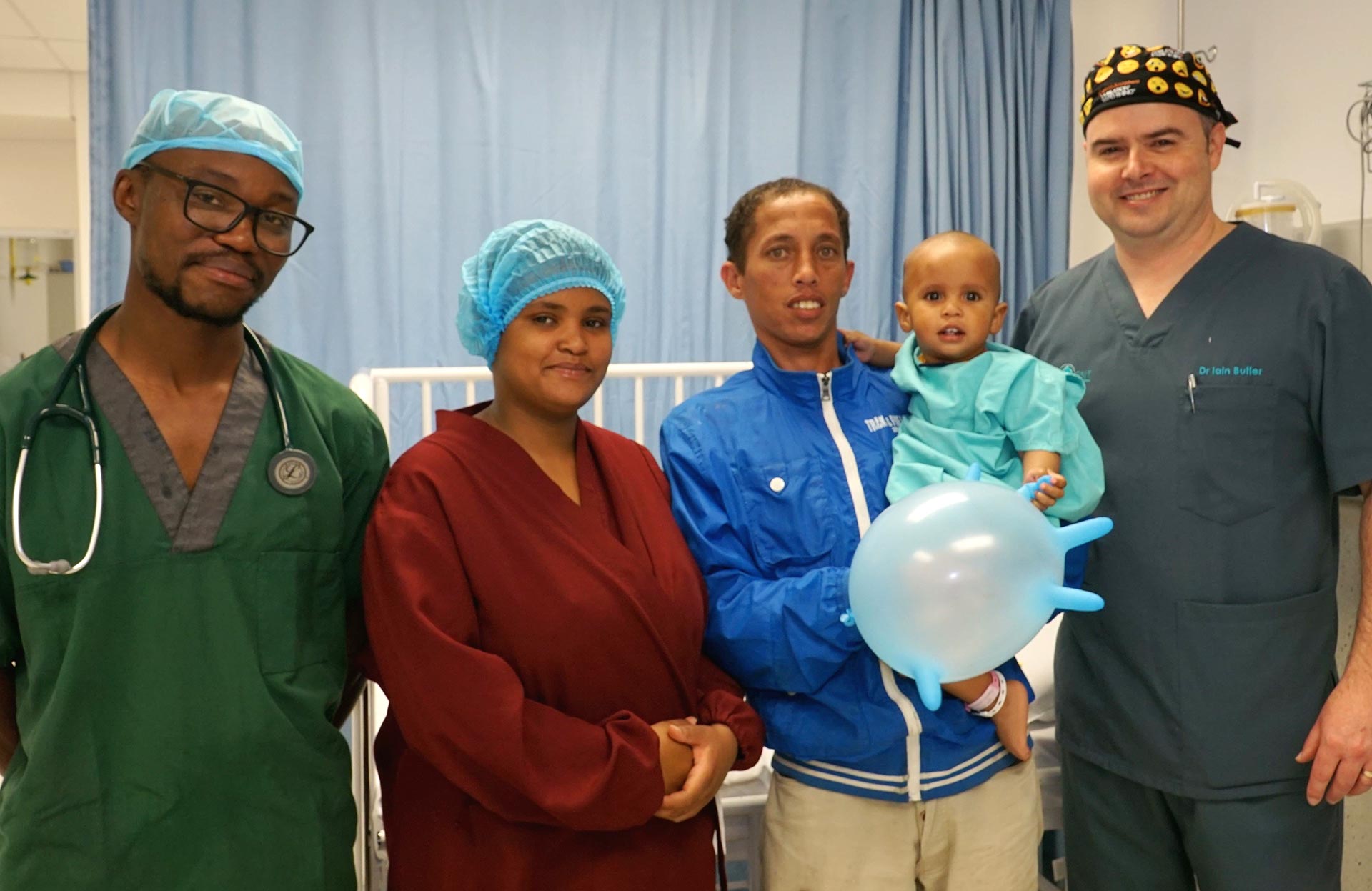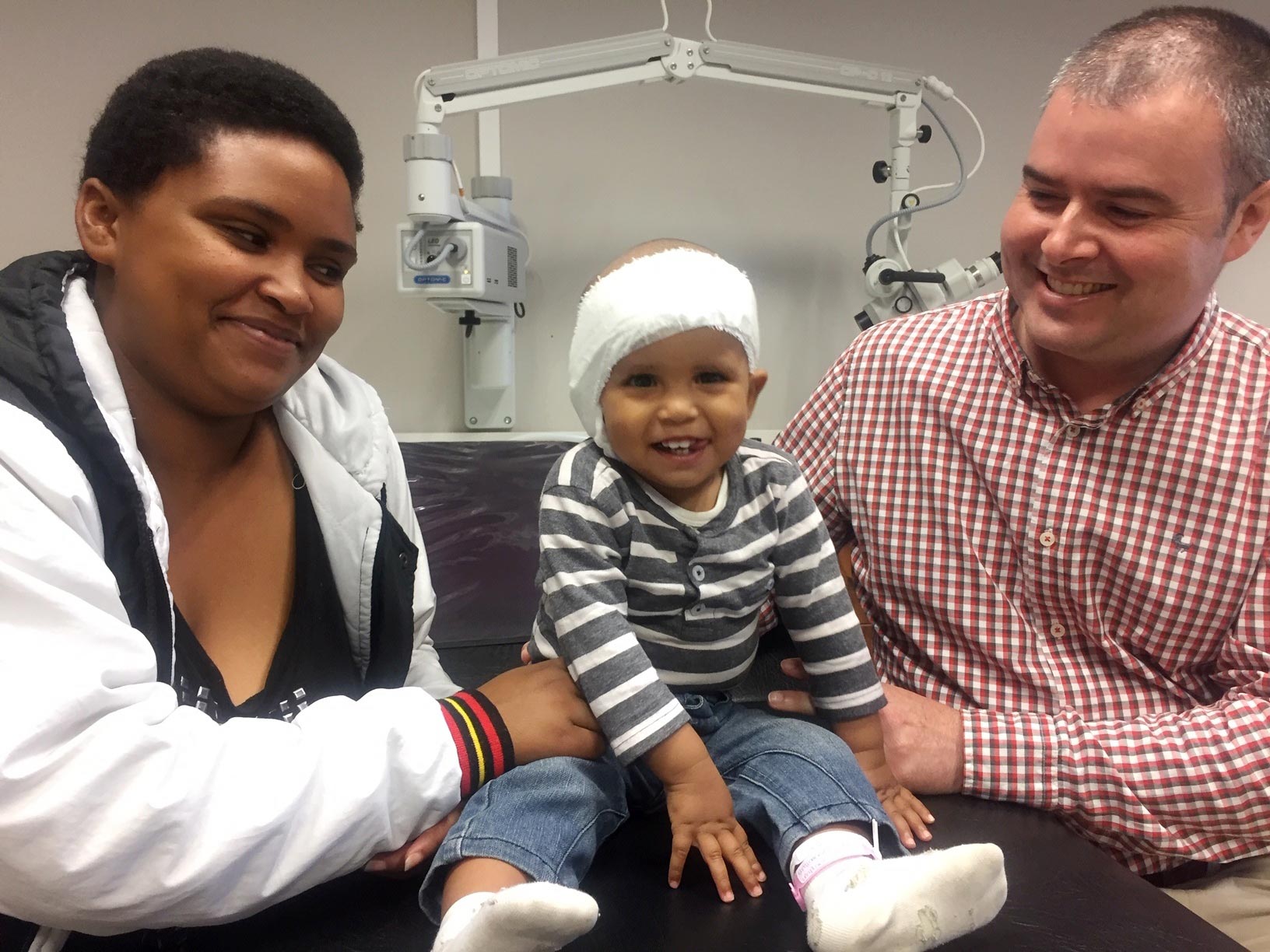Good Samaritans bring the world of sound to brave 18-month-old Port Elizabeth boy
Drickus Maartens • November 20, 2019
Above: Grayson Marais with his parents, Mr Christopher Murphy and Mrs Antoinette Marais (centre), pictured at Netcare Greenacres Hospital just prior to the cochlear implant procedure. With them are anaesthetist, Dr Chris Ngaka (left), and ear, nose and throat (ENT) specialist, Dr Iain Butler.
Medical team enables implantation of cochlear hearing device
Brave 18-month-old Grayson Marais from Port Elizabeth experienced the world of sound for the very first time yesterday, thanks to the goodwill of a team of specialists, Netcare
Greenacres Hospital, the Netcare Foundation and the Port Elizabeth Provincial Hospital.
This team recently joined hands to ensure that the pro bono cochlear implant procedure which was undertaken at the well-known Port Elizabeth private hospital by ear, nose and throat (ENT) specialist, Dr Iain Butler with the assistance of anaesthetist, Dr Chris Ngaka.
“Grayson’s implantation procedure was completed successfully, and he was doing well when we removed his bandages and stitches at our first follow up consultation recently,” comments Dr Butler. “His cochlear device was turned on for the first time at Port Elizabeth Provincial Hospital yesterday and we are hopeful that with the necessary speech and listening therapies, he will go on to hear and to be able to speak normally. My colleagues and I were thrilled to have been able to assist this delightful little boy, who always has a big smile on his face.”
Grayson’s mother, Antoinette Marais, adds: “My family and I are so grateful that my son was able to receive the great gift of this cochlear implantation, and we would like to convey our deepest appreciation to Dr Butler and his team for doing the procedure free of charge, as well as to the Netcare Foundation and Netcare Greenacres Hospital for covering all the theatre and other in-hospital costs of Grayson’s procedure and to the Port Elizabeth Provincial Hospital for covering the costs of the cochlear device.”
“My family and I are also thankful to audiologist, Babalwa Potelwa at Port Elizabeth Provincial Hospital who first detected Grayson’s hearing problem and who has been exceptionally supportive throughout,” she says.
Above:
Brave 18-month-old Grayson Marais from Port Elizabeth (centre) pictured just prior to his bandages being removed at Netcare Greenacres Hospital. With Grayson is his mother Antoinette Marais (left), and Dr Iain Butler, the ear, nose and throat (ENT) specialist who performed the cochlear implant.
According to Dr Butler, Grayson was born with profound hearing impairment, and ordinary hearing aids would not have been a solution for his condition. “The early implantation of a cochlear device is important for children such as Grayson, as it enables them to become familiar with sound as early as possible and to develop their speech and communication skills from an early age. This also shows the importance of the early detection of hearing problems in new-borns,” he adds.
“It is, however, important to note that the implantation of the cochlear device in a child born as profoundly deaf as Grayson, is only the first step, as intensive follow-up speech and listening therapies in the years to come are also critically important in their journey to hearing and speaking. Where this can be facilitated, the device enables the child’s development to follow a normal development trajectory and is positively life-changing.”
Dr Butler explains that the external ‘microphone’ part of the cochlear device picks up signals from the environment, which the implant then sends directly to the auditory nerve in the ear and to the brain, which comes to recognise the signal as sound. In this way the complex cochlear implant technology is able to bypass the damaged areas of the ear.
“A child such as Grayson, who has not heard sound in his life before, can become overwhelmed when the device is first turned on. For this reason, we start off using a very low ‘volume’. Then, as the child becomes more familiar with hearing these new sounds from the environment, the ‘volume’ is turned up gradually over a number of weeks.”
Approximately three to six in 1 000 children are born with some form of hearing impairment, which is the most common of the sensory deficits occurring in newborns. Approximately one in 1 000 children are born with profound hearing impairment, such as was the case with Grayson. Dr Butler says cochlear implantation can provide a real solution for children born with profound deafness, but the device and supporting therapies are costly.
“As private practitioners, we look to link up with the state health sector and non-governmental organisations at least a couple of times every year to assist in addressing the huge need among underprivileged children who are born deaf for appropriate medical intervention.
“In fact, Dr Retief and I performed a cochlear procedure on Grayson’s brother a year ago and he has responded well to the treatment,” says Dr Butler. It is great for us to be able to team up with Netcare Greenacres Hospital and the Netcare Foundation on such initiatives that make a meaningful and long-term difference in the lives of children.”
“Corporate social responsibility is entrenched in our organisation. Throughout our Netcare operations, doctors and staff members have a deep commitment to assist in improving the quality of life for less privileged individuals and communities through many different outreach initiatives,” says Mande Toubkin, who heads up the corporate social investment (CSI) department in Netcare and is also a director of the Netcare Foundation.
She explains that other specialised surgical programmes that are supported by the Netcare Foundation on an ongoing basis include craniofacial surgery to correct severe facial anomalies, surgical correction of cleft lip and palate mainly in children, and cataract surgery to restore the sight of mainly senior citizens.
Andre Bothma, general manager of Netcare Greenacres Hospital, says the staff at the facility felt privileged to have been of assistance to the energetic and courageous little boy and his family.
“Our aim at Netcare Greenacres Hospital is to provide each of our patients and their families with medical treatment and personal care that are appropriate and beneficial for their particular condition and personal circumstances. We trust that his procedure will be of great benefit to little Grayson,” concludes Bothma.














